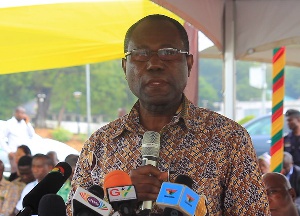- Home - News
- TWI News | TV
- Polls
- Year In Review
- News Archive
- Crime & Punishment
- Politics
- Regional
- Editorial
- Health
- Ghanaians Abroad
- Tabloid
- Africa
- Religion
- Election 2020
- Coronavirus
- News Videos | TV
- Photo Archives
- News Headlines
- Press Release
General News of Thursday, 20 December 2018
Source: dailyguideafrica.com
COCOBOD builds 9 schools
The Ghana Cocoa Board (Cocobod) has commissioned nine schools in five regions as part of its Child Education Support Programme.
The Child Education Support Programme was introduced in 2014 with an initial capital of GH¢2 million and later increased to GH¢ 4.03 million or $1.06 million.
It aims at fighting the worst forms of child labor in Ghana’s cocoa sector as alleged in the early 2000s by the global community.
The nine commissioned schools form part of a total of 12 projects which were awarded for construction about four years ago.
The schools are situated in Appaihkrom, Akutreso, Senchiem, Nsonnan, Twifo Heman, Attakrom, Bomposo, Obosomase, and Sefwi Kaase, of the Agona East, New Tafo, Via East, Juaso, Andansi South, Assin Fosu, Agona West, Twifo Praso, in the Sunyani District, all in the Western, Eastern, Central, Ashanti and Brong Ahafo regions respectively.
Speaking on behalf of the Chief Executive Officer of Cocobod, Joseph Boahen Aidoo, at a symbolic handing over ceremony on Wednesday at Obosomase Anglican Basic School in the Central Region, where a six unit classroom block was commissioned, Deputy Chief Executive Officer of Cocobod in Charge of Operations, Emmanuel Opoku, said Cocobod has identified cocoa communities that lacked school infrastructure and has decided to provide them with school blocks to save the children in the respective communities from walking long distances to school.
The intention, he said, was to create a conducive atmosphere that promotes learning.
According to him, “to achieve these goals, Cocobod, working with the community leaders, has selected some deprived and needy communities for the first phase of the programme’s implementation.”
He disclosed that for instance, “the Obosomase School building comprises a 6-Unit classroom block, Crèche/kindergarten 1 and 2, and a Head Teacher’s office with a Secretariat. Other ancillary facilities include good drainage system, restroom/toilet, borehole water systems equipped with hand pumps all costing GH¢ 446,484.12.”
He recounted that in response to the global community’s report about child labor in Ghana’s cocoa industry, Cocobod in collaboration with the Ministry of Employment and Social Welfare in 2001 through 2006 and beyond, carried out series of surveys in cocoa growing areas to ascertain the existence of the traces of children’s engagement in cocoa farming and if known to exist, the nature and how to tackle it.
Following the release of the findings of the surveys which showed some level of children’s engagement in cocoa farming, he said the Government of Ghana in 2006 with support from development partners including US and Dutch Governments, established the National Programme for the Elimination of Worst Forms of Child Labor in the cocoa sector.
According to him, after years of sensitization using community radio stations, dramas and cinema shows in local languages as well as durbars to promote behavioral change, Cocobod rolled out the Child Education Support Programme in 2014.
He added that “…4 years down the line, I am happy to inform you that of the 12 projects which were awarded for construction, nine are ready for commissioning.”
Agona East District Director of Education, Vida Amoah, commended the Cocobod for the educational support programme, saying the Obosomase school block marks another milestone in the history of the Central Regional education directorate.
District Chief Executive (DCE) for Agona East, Dennis Frimpong observed that Cocobod has over the years undertaken several projects such as cocoa tree spraying aimed at improving the livelihood of cocoa farmers and their dependants.
Entertainment










